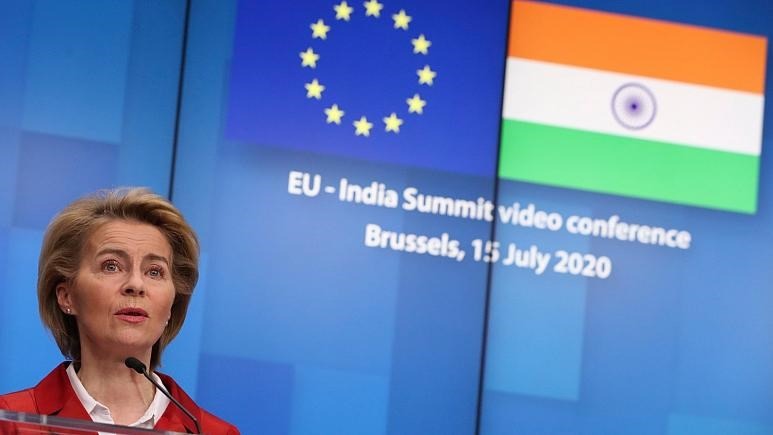Eleven percent of India’s total trade in goods and services in 2020 (96 billion euro) was with the European Union. There are also around 6,000 European companies operating in India, creating 1.7 million jobs directly and five million jobs indirectly.
Bilateral talks between Brussels and India in 2013, which were suspended due to disputes over tariffs, intellectual property and some other issues, now after the EU-India summit in May 2021, has resumed in order to reach an investment and trade agreement.
European countries see India not only as a superpower in South Asia, but also considers Delhi as a power that could prevent China from gaining more power. This special attention of Europe can be seen in 2018, when the European Union considered India as a geopolitical pillar in a multipolar world. India is also a player that can maintain balance of power in South Asia and even in the entire Asia.
China component, warming of bilateral relations
The geopolitical landscape has changed dramatically since the halt in India-EU talks in 2013. Rising tensions between India and China, as well as European efforts to reduce dependence on China, have changed the policies of New Delhi and Brussels.
When the Chinese and Indian prime ministers celebrated the 70th anniversary of the establishment of diplomatic relations between Delhi and Beijing in April 2020, few expected the relations between the two sides to be strained. Within three months, at least 20 Indian soldiers and a number of Chinese soldiers were killed in border clashes between the two countries.
The Indian government has also banned the use of 118 Chinese apps and mobile phones. Sino-Indian relations have entered a tense cycle since then. The Coronavirus pandemic has also worsened the situation between India and China. India, on the other hand, has plans to strengthen economic ties with Japan and Australia to change relations in the India-Pacific region.
India and the European Union somehow send their own geopolitical signals to other actants and seek to achieve their targets. The European Union is seeking strategic independence in the wake of the Coronavirus epidemic and recent developments, including the US withdrawal from Afghanistan.
By implementing its new strategy in the Asia-Pacific region, Brussels also seeks to diversify its trading partners in the Indo-Pacific region. The EU’s efforts to develop bilateral relations with India have been driven by economic, political and strategic concerns.
Given the emergence of waves of economic nationalism around the world, Brussels emphasizes European strategic independence and economic sovereignty and the need to reduce external dependence. The EU could use India as an alternative to China to expand its exports and trade.
In recent years, relations between Beijing and Delhi have faced many ups and downs. Delhi, with the help of countries outside the region, is seeking to get more bargaining levers. Indian officials believe that by expanding this cooperation, they can gain a geopolitical advantage over China.
India’s economy has also been hit hard by the Coronavirus epidemic. India hopes that negotiations with the European Union on a free trade area will help its economy. The Indians have sent a message at various intervals that if countries are interested in changing production conditions, especially in geopolitical areas, Delhi is ready to do so.
This policy has been India’s political priority since 2014; a “Made in India” policy aimed at challenging China as the largest manufacturing hub. The Coronavirus epidemic has made both New Delhi and Brussels interested in boosting economic cooperation. In fact, Brussels and New Delhi will be challenged on how to boost their economic growth after the end of the Coronavirus epidemic.
The EU is looking to strengthen its supply chains to reduce its dependence on China, and India wants to present itself as a safe alternative to European investment.
Concluding remarks
In recent months, the Chinese component has led to more dynamism in Delhi-Brussels relations, although this does not mean that the EU will suspend trade relations with China. It should be noted that the resumption of trade talks between Brussels and Delhi is not only an economic issue, but also a political one. In fact, New Delhi believes that the relationship between India and the European Union cannot have only one foundation and will become strengthened by adding a geopolitical dimension to it.
Of course, the current growing partnership has not developed all at once, and it has taken decades for it to flourish. In recent years, factors such as the Coronavirus pandemic, India’s distrust in the Belt and Road Initiative, as well as concerns about Huawei monopoly in G5 technology have contributed to this paradigm shift.
The very good relations between India, France and Germany have also been effective in strengthening the relations between Brussels and Delhi. It can be said that the current geopolitical context of the Indo-Pacific region has also increased the importance of bilateral relations between the Union and India. The Indo-Pacific region will be the geopolitical center of the next decade, and Beijing is changing the situation in the region, which is why India and the European Union are forced to strengthen cooperation.
Although the two sides are keen to strengthen cooperation, little progress has been made in some key areas, including India’s tariffs on European goods.
In fact, the prospects for economic cooperation between Brussels and Delhi remain unclear due to the deep bilateral divergence in cultural, economic and political spheres.










0 Comments